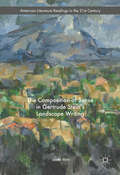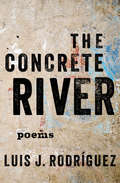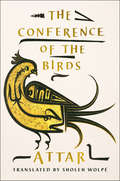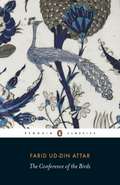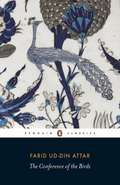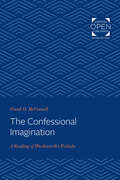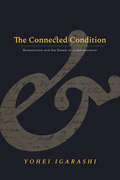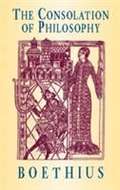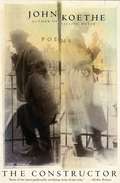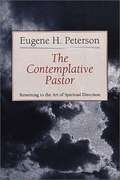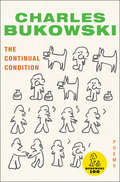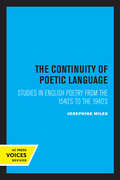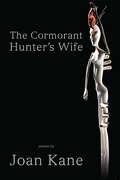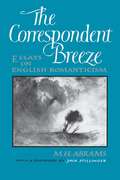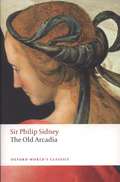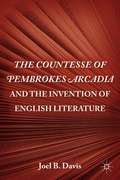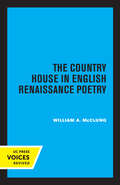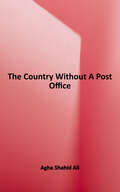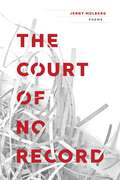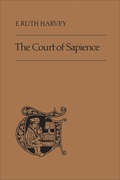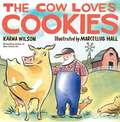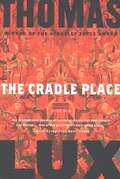- Table View
- List View
The Composition of Sense in Gertrude Stein's Landscape Writing (American Literature Readings in the 21st Century)
by Linda VorisThis book offers a bold critical method for reading Gertrude Stein’s work on its own terms by forgoing conventional explanation and adopting Stein’s radical approach to meaning and knowledge. Inspired by the immanence of landscape, both of Provence where she travelled in the 1920s and the spatial relations of landscape painting, Stein presents a new model of meaning whereby making sense is an activity distributed in a text and across successive texts. From love poetry, to plays and portraiture, Linda Voris offers close readings of Stein’s most anthologized and less known writing in a case study of a new method of interpretation. By practicing Stein’s innovative means of making sense, Voris reveals the excitement of her discoveries and the startling implications for knowledge, identity, and intimacy.
The Concrete River: Poems
by Luis J. RodríguezA mesmerizing collection of poems of urban pain and immigrant alienation, humming with a current of genuine beauty and the pulse of lifeThe Concrete River&’s poems are dispatches from city corners that CNN viewers never see, that few dare visit, and that fewer still manage to escape. Rodríguez sings corridos of barrios and busted Chicanos trying to make it in L.A. and Chicago, from ballads of Watts&’s broken glass to blues played alongside a tequila bottle under an elevated train. But the music also captures moments of true beauty amid the hard urban surfaces, where the cries of the &’hood &“deliver sacrifices / of sound and flesh, / as a mother&’s milk flows,&” while love and community offer renewed hope. This ebook features an illustrated biography of Luis J. Rodríguez including rare images from the author&’s personal collection.
The Confederation Group of Canadian Poets, 1880-1897
by D.M.R. BentleyAs one of the formative periods in Canadian history, the late nineteenth century witnessed the birth of a nation, a people, and a literature. In this study of Canada's first 'school' of poets, D. M. R. Bentley combines archival work, including extensive research in periodicals and newspapers, with close readings of the work of Charles G. D. Roberts, Archibald Lampman, Bliss Carman, William Wilfred Campbell, Duncan Campbell Scott, and Frederick George Scott. Bentley chronicles the formation, reception, national and international successes, and eventual disintegration (after the 1895 'War Among the Poets') of the Confederation Group, whose poetry forever changed the perception and direction of Canadian literature. With the aid of biographical, political, and sociological analyses, Bentley's literary history delineates the group's political, aesthetic, and thematic dispositions and characteristics, and contextualizes them not only within Canadian history and politics, but also within contemporary intellectual and literary currents, including Romantic nationalism, 'Canadianism', and poetic formalism. Bentley casts new light on the poets' commonalities - such as their debt to Young Ireland, their commitment to careful workmanship, and their participation in the American mind-cure movement - as well as on their most accomplished and anthologized poems from 1880 to 1897. In the process, he presents a compelling case for the literary and historical importance of these six men and their poems in light of Canada's cultural and political past, and defends their right to be known as Canada's first poetic fraternity at a time when Canada was striving to achieve literary and national distinction. "The Confederation Group of Canadian Poets, 1880-1897" is an erudite and innovative work of literary history and critical interpretation that belongs on the bookshelf of every serious scholar of literary studies.
The Conference of the Birds
by Attar Sholeh WolpéAward-winning translator Sholeh Wolpé recaptures the beauty and lyricism of one of Persian literature’s most celebrated masterpieces. Considered by Rumi to be “the master” of Sufi mystic poetry, Attar is best known for his epic poem The Conference of the Birds, a magnificent allegorical tale about the soul’s search for meaning. The poem recounts the perilous journey of the world’s birds to the faraway peaks of Mount Qaf—a mythical mountain that wraps around the earth—in search of their king, the mysterious Simorgh. Attar’s beguiling anecdotes and humor intermingle the sublime with the mundane, the spiritual with the worldly, and the religious with the metaphysical. Reflecting the entire evolution of Sufi mystic tradition, The Conference of the Birds models the soul’s escape from the mind’s rational embrace. Wolpé re-creates the intense beauty of the original Persian in contemporary English verse and poetic prose, capturing for the first time the grace and timeless wisdom of Attar’s complete masterwork for modern readers.
The Conference of the Birds
by Farid AttarComposed in the twelfth century in north-eastern Iran, Attar's great mystical poem is among the most significant of all works of Persian literature. A marvellous, allegorical rendering of the Islamic doctrine of Sufism - an esoteric system concerned with the search for truth through God - it describes the consequences of the conference of the birds of the world when they meet to begin the search for their ideal king, the Simorgh bird. On hearing that to find him they must undertake an arduous journey, the birds soon express their reservations to their leader, the hoopoe. With eloquence and insight, however, the hoopoe calms their fears, using a series of riddling parables to provide guidance in the search for spiritual truth. By turns witty and profound, The Conference of the Birds transforms deep belief into magnificent poetry.
The Conference of the Birds
by Farid Ud-Din AttarComposed in the twelfth century in north-eastern Iran, Attar's great mystical poem is among the most significant of all works of Persian literature. A marvellous, allegorical rendering of the Islamic doctrine of Sufism - an esoteric system concerned with the search for truth through God - it describes the consequences of the conference of the birds of the world when they meet to begin the search for their ideal king, the Simorgh bird. On hearing that to find him they must undertake an arduous journey, the birds soon express their reservations to their leader, the hoopoe. With eloquence and insight, however, the hoopoe calms their fears, using a series of riddling parables to provide guidance in the search for spiritual truth. By turns witty and profound, The Conference of the Birds transforms deep belief into magnificent poetry.
The Confessional Imagination: A Reading of Wordsworth's Prelude
by Frank D. McConnellOriginally published in 1974. This book concerns the archetypal quality of Wordsworth's The Prelude, specifically the ways in which it develops and defines concepts of language, time, and narrative that influenced writers who came after Wordsworth. Frank D. McConnell sees the philosopher and theologian St. Augustine as the most suggestive analogue for the Wordsworthian quest for lost time and for the redemptive power of memory. McConnell maps similarities and dissimilarities between Wordsworth's Prelude and Augustine's Confessions. Each chapter of the book centers on an aspect of Wordsworth's confessional procedure in writing the poem. Chapter 1 ascribes peculiarities in the mode of address to The Prelude's definitive auditor, Coleridge, as a felt presence that shapes the overall form of the poem. Chapter 2 discusses the confessional—and Wordsworthian—view of the human career, contrasting the holistic and organic ideal of man's development with a more ancient and allegorical, or daemonic, view against which the confessional vision struggles. Chapter 3 carries the argument to the more fundamental level of the senses of sight and hearing. And chapter 4 deals with language itself, the irreducible counters of Wordsworth's vision and the highly specialized confessional language of "Edenic words." The general direction of the author's reading is a narrowing of focus from the most general to the most specific features of the confessional act.
The Connected Condition: Romanticism and the Dream of Communication (Stanford Text Technologies)
by Yohei IgarashiThe Romantic poet's intense yearning to share thoughts and feelings often finds expression in a style that thwarts a connection with readers. Yohei Igarashi addresses this paradox by reimagining Romantic poetry as a response to the beginnings of the information age. Data collection, rampant connectivity, and efficient communication became powerful social norms during this period. The Connected Condition argues that poets responded to these developments by probing the underlying fantasy: the perfect transfer of thoughts, feelings, and information, along with media that might make such communication possible. This book radically reframes major poets and canonical poems. Igarashi considers Samuel Taylor Coleridge as a stenographer, William Wordsworth as a bureaucrat, Percy Shelley amid social networks, and John Keats in relation to telegraphy, revealing a shared attraction and skepticism toward the dream of communication. Bringing to bear a singular combination of media studies, the history of communication, sociology, rhetoric, and literary history, The Connected Condition proposes new accounts of literary difficulty and Romanticism. Above all, this book shows that the Romantic poets have much to teach us about living with the connected condition and the fortunes of literature in it.
The Consolation of Philosophy
by Boethius Richard H. GreenOne of the most popular books in Western Europe from the time it appeared in Latin in 524 until the end of the Renaissance, its subject is achieving happiness amidst suffering. Boethius wrote his work of poetry, prose, and personification while imprisoned for treasonable offenses for which he was eventually executed by edict of the Senate he once served. The book opens with a poem whose first line is "I who once wrote songs with keen delight am now by sorrow driven to take up melancholy measures." Boethius continues with the prescriptions to follow nature, and ends by contemplating the eternal.
The Constructor
by John Koethe"John Koethe's The Constructor is a scrupulous, elegant account of the meditative intellect as an instrument continually registering the passage of time. Exquisitely modulated and brutally honest, these poems would be harrowing were they not so seductively beautiful. No one writing in this country today sees as deeply as Koethe into the tears that lie at the heart of things, and no contemporary investigation of the life of the mind may be called complete that does not accommodate the lush intricacy of his terrifying recognitions."-- George Bradley"I prize John Koethe's intimate expanses and unsettling reveries, his tender contemplations and odd mental landscapes. He is an heir to Wallace Stevens and John Ashbery and, like them, he gives us the sensation of thinking itself, of a certain fleeting, daily, solitary consciousness rescued from oblivion and held aloft."-- Edward Hirsch
The Contemplative Pastor: Returning to the Art of Spiritual Direction
by Eugene H. PetersonPeterson shares his reflections on being a pastor after 30 years of being a parish pastor.
The Continual Condition: Poems
by Charles BukowskiA volume of never-before-collected poems from America's most imitated and influential poetIn the literary pantheon, Charles Bukowski remains a counterculture icon. A hard-drinking wild man of literature, a stubborn outsider to the poetry world, he has struck a chord with generations of readers, writing raw, tough poetry about booze, work, and women that speaks to his fans as being "real" and, like the work of the Beats, even dangerous.Edited by his longtime publisher John Martin of Black Sparrow Press, The Continual Condition includes more of this legend's never-before-collected poems.
The Continuity of Poetic Language: Studies in English Poetry from the 1540's to the 1940's
by Josephine MilesThis title is part of UC Press's Voices Revived program, which commemorates University of California Press’s mission to seek out and cultivate the brightest minds and give them voice, reach, and impact. Drawing on a backlist dating to 1893, Voices Revived makes high-quality, peer-reviewed scholarship accessible once again using print-on-demand technology. This title was originally published in 1951.
The Cormorant Hunter's Wife (The Alaska Literary Series)
by Joan KaneThis collection of poetry is inspired by the author’s lineage as an Iñupiaq Eskimo woman with family from King Island and Mary’s Igloo, Alaska. The poems’ syncopated cadences and evocative images bring to life the exceptional physical and cultural conditions of the Arctic and sub-Arctic that have been home to her ancestors for tens of thousands of years, while the poems’ speakers refer to an indigenous identity that has become increasingly plural. The author’s perspective as a Native person affords her unique insight into the relationship with place and self, which she applies in her consideration of the arctic landscape and to questions of adaptation and resilience. Kane’s work refers to the Inupiaq oral tradition, and while in some poems she continues to revisit, rewrite, and revise traditional narratives that are suited to the lyric form, she moves beyond narrative retelling, honoring the legacy of imagination that has sustained Inupiaq people for millennia.
The Correspondent Breeze: Essays on English Romanticism
by M. H. AbramsIn method the essays represent a combination of historical and biographical interpretation, explication of specific texts, and the study of sources, genre, and style; less formally, they represent the application of knowledge and intuition based on several decades of reading, thinking, and life experience.
The Countess of Pembroke's Arcadia (The Old Arcadia)
by Katherine Duncan-Jones Philip SidneyPhilip Sidney was in his early twenties when he wrote his `Old' Arcadia for the amusement of his younger sister, the Countess of Pembroke. The book, which he called 'a trifle, and that triflingly handled', reflects their youthful vitality. The `Old' Arcadia tells a romantic story in a manner comparable to that of Shakespeare's early comedies. It is divided into five `Acts', and abounds in lively speeches, dialogues, and quasi-dramatic tableaux. Two young princes, Pyrocles and Musidorus, disguise themselves as an Amazon and a shepherd to gain access to the Arcadian Princesses, who have been taken into semi-imprisonment by their father to avoid the dangers foretold by an oracle. As a vehicle for Sidney's prophetic ideas about English versification, the `Old' Arcadia also includes over seventy poems in a wide variety of metres and genres. In clarity, symmetry, and coherence the `Old' version is greatly superior both to the ambitious but unfinished `New' Arcadia and the amalgamated, `composite' version, a hybrid monster which Sidney himself never envisaged.
The Countesse of Pembrokes Arcadia and the Invention of English Literature
by Joel B. DavisRevises the semiotic paradigm of the early modern 'literary system' dominant since 1983 by adapting methods entailed in the idea that literary works emerge through a series of semiotic events. Davis analyzes Philip Sidney's Arcadia and Astrophil and Stella to demonstrate how design elements stage the scene of reading these works.
The Country House in English Renaissance Poetry
by William Alexander McClungThis title is part of UC Press's Voices Revived program, which commemorates University of California Press’s mission to seek out and cultivate the brightest minds and give them voice, reach, and impact. Drawing on a backlist dating to 1893, Voices Revived makes high-quality, peer-reviewed scholarship accessible once again using print-on-demand technology. This title was originally published in 1977.
The Country without a Post Office: Poems
by Agha Shahid Ali"Translucent elegies 'for the city that is leaving forever' (Srinagar) from one of its sons, who also happens to be one of America's finest younger poets."―John Ashbery
The Court of No Record: Poems
by Jenny MolbergJenny Molberg’s third collection of poetry, The Court of No Record, serves as both evidence and testimony against a legal system that often fails victims of physical trauma and domestic abuse. Drawing inspiration from true crime investigations and artifacts, including Frances Glessner Lee’s crime scene dioramas and the tragic aftermaths of two serial killers who preyed upon women in Baton Rouge, Louisiana, Molberg probes a cultural obsession with violence that performs active erasure of victims’ lives. By engaging with historical texts through a personal lens, she sheds light on survivors who do not find justice and looks toward a future of positive systemic reformation.
The Court of Sapience
by Elizabeth Ruth HarveyThe medieval English allegorical poem, The Court of Sapience, was written in the middle of the fifteenth century by an unknown author. It is best described as an encyclopaedia: in the allegory the poet describes the nature and activities of wisdom in all its aspects. He includes a moving account of the fall of a man and his restoration by divine wisdom; then he leads his dreamer through a landscape where all the traditional beauties of nature are catalogued and assigned their properties. The visit to the castle of Sapience, inhabited by all the branches of learning and the seven restorative virtues, completes the poem as we have it. The first edition was an early production of Caxton's press, and it was reprinted by his successor, Wynkyn de Worde. This is a new edition of Caxton's text of the poem. Variant readings from the extant manuscripts have investigated in detail and are discussed in the lengthy introduction and extensive commentary. The poem is an attractive work in itself, and has been admired by C.S. Lewis and other modern critics. It is also a valuable witness to the taste of the early Tudor period.
The Cow Loves Cookies
by Karma WilsonThere are lots of different animals on the farm, and they all love their own special sort of food. The horse loves his hay and the geese flip for corn. But not Cow! Cow would never eat that stuff. You couldn't pay the cow enough! Because . . . the cow loves cookies. From the bestselling author of Bear Snores On, Karma Wilson, and renowned illustrator Marcellus Hall comes a rip-roaring, rhyming, read-aloud story that's perfect for picky eaters of all ages.
The Cradle Place
by Thomas Lux"[Lux is] sui generis, his own kind of poet, unlike any of the fashions of his time." - Stanley KunitzThomas Lux is humorous, edgy, and ever surprising in The Cradle Place, his tenth collection of verse. These fifty-two poems question language and intention and the sometimes untidy connections between the human and natural worlds. Lux has long been an outspoken advocate for the relevance of poetry in American culture, and his voice is urgent and unrelentingly evocative. As Sven Birkerts has noted, "Lux may be one of the poets on whom the future of the genre depends.""A book full of arresting images . . . The natural world, as it appears here, is at first lovely . . . but turns out dangerously vanquished . . . Not since Plath has hysteria looked this kissable." - San Francisco Chronicle"Lux has a gift for the swiftly turned expression . . . Such immediacy and quirkiness will hold a reader." - Poetry"Readers will be mesmerized." - Poetry Book of the Year, Library JournalTHOMAS LUX holds the Bourne Chair in Poetry and is director of the McEver Visiting Writers Program at the Georgia Institute of Technology. He has been awarded three NEA grants and the Kingsley Tufts Award, and is a former Guggenheim Fellow. He lives in Atlanta.
